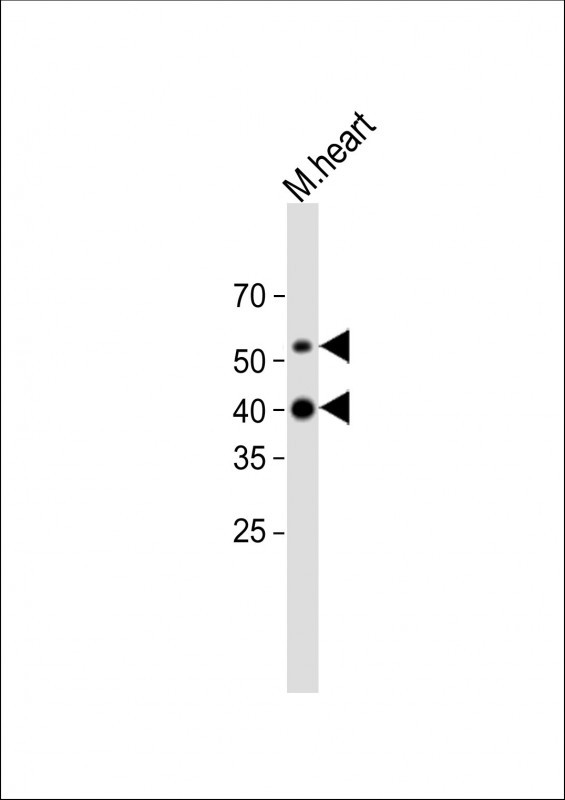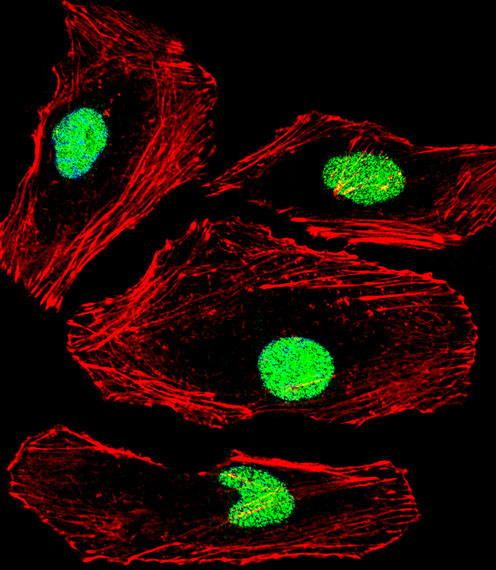MBD2 Antibody (Center)
Affinity Purified Rabbit Polyclonal Antibody (Pab)
- 产品详情
- 实验流程
- 背景知识
Application
| WB, IF, E |
|---|---|
| Primary Accession | Q9UBB5 |
| Other Accession | Q9Z2E1, NP_056647.1 |
| Reactivity | Human |
| Predicted | Mouse |
| Host | Rabbit |
| Clonality | Polyclonal |
| Isotype | Rabbit IgG |
| Calculated MW | 43255 Da |
| Antigen Region | 250-279 aa |
| Gene ID | 8932 |
|---|---|
| Other Names | Methyl-CpG-binding domain protein 2, Demethylase, DMTase, Methyl-CpG-binding protein MBD2, MBD2 |
| Target/Specificity | This MBD2 antibody is generated from rabbits immunized with a KLH conjugated synthetic peptide between 250-279 amino acids from the Central region of human MBD2. |
| Dilution | WB~~1:1000 IF~~1:10~50 E~~Use at an assay dependent concentration. |
| Format | Purified polyclonal antibody supplied in PBS with 0.05% (V/V) Proclin 300. This antibody is purified through a protein A column, followed by peptide affinity purification. |
| Storage | Maintain refrigerated at 2-8°C for up to 2 weeks. For long term storage store at -20°C in small aliquots to prevent freeze-thaw cycles. |
| Precautions | MBD2 Antibody (Center) is for research use only and not for use in diagnostic or therapeutic procedures. |
| Name | MBD2 (HGNC:6917) |
|---|---|
| Function | Binds CpG islands in promoters where the DNA is methylated at position 5 of cytosine within CpG dinucleotides (PubMed:9774669). Binds hemimethylated DNA as well (PubMed:10947852, PubMed:24307175). Recruits histone deacetylases and DNA methyltransferases to chromatin (PubMed:10471499, PubMed:10947852). Acts as a component of the histone deacetylase NuRD complex which participates in the remodeling of chromatin (PubMed:16428440, PubMed:28977666). Acts as a transcriptional repressor and plays a role in gene silencing (PubMed:10471499, PubMed:10947852, PubMed:16415179). Functions as a scaffold protein, targeting GATAD2A and GATAD2B to chromatin to promote repression (PubMed:16415179). May enhance the activation of some unmethylated cAMP-responsive promoters (PubMed:12665568). |
| Cellular Location | Nucleus. Chromosome Note=Nuclear, in discrete foci (PubMed:12183469). Detected at replication foci in late S phase. Localizes to methylated chromatin (PubMed:16428440). Localizes to sites of DNA damage in a manner partially dependent on ZMYND8 (PubMed:27732854) |
| Tissue Location | Highly expressed in brain, heart, kidney, stomach, testis and placenta. |
For Research Use Only. Not For Use In Diagnostic Procedures.
Provided below are standard protocols that you may find useful for product applications.
BACKGROUND
DNA methylation is the major modification of eukaryotic genomes and plays an essential role in mammalian development. Human proteins MECP2, MBD1, MBD2, MBD3, and MBD4 comprise a family of nuclear proteins related by the presence in each of a methyl-CpG binding domain (MBD). Each of these proteins, with the exception of MBD3, is capable of binding specifically to methylated DNA. MECP2, MBD1 and MBD2 can also repress transcription from methylated gene promoters. The protein encoded by this gene may function as a mediator of the biological consequences of the methylation signal. It is also reported that the this protein functions as a demethylase to activate transcription, as DNA methylation causes gene silencing.
REFERENCES
Liu, C.Y., et al. Carcinogenesis 31(7):1259-1263(2010)
Guey, L.T., et al. Eur. Urol. 57(2):283-292(2010)
Hosgood, H.D. III, et al. Respir Med 103(12):1866-1870(2009)
McDonough, C.W., et al. Hum. Genet. (2009) In press :
Shen, M., et al. Environ. Mol. Mutagen. 50(4):285-290(2009)
终于等到您。ABCEPTA(百远生物)抗体产品。
点击下方“我要评价 ”按钮提交您的反馈信息,您的反馈和评价是我们最宝贵的财富之一,
我们将在1-3个工作日内处理您的反馈信息。
如有疑问,联系:0512-88856768 tech-china@abcepta.com.























 癌症的基本特征包括细胞增殖、血管生成、迁移、凋亡逃避机制和细胞永生等。找到癌症发生过程中这些通路的关键标记物和对应的抗体用于检测至关重要。
癌症的基本特征包括细胞增殖、血管生成、迁移、凋亡逃避机制和细胞永生等。找到癌症发生过程中这些通路的关键标记物和对应的抗体用于检测至关重要。 为您推荐一个泛素化位点预测神器——泛素化分析工具,可以为您的蛋白的泛素化位点作出预测和评分。
为您推荐一个泛素化位点预测神器——泛素化分析工具,可以为您的蛋白的泛素化位点作出预测和评分。 细胞自噬受体图形绘图工具为你的蛋白的细胞受体结合位点作出预测和评分,识别结合到自噬通路中的蛋白是非常重要的,便于让我们理解自噬在正常生理、病理过程中的作用,如发育、细胞分化、神经退化性疾病、压力条件下、感染和癌症。
细胞自噬受体图形绘图工具为你的蛋白的细胞受体结合位点作出预测和评分,识别结合到自噬通路中的蛋白是非常重要的,便于让我们理解自噬在正常生理、病理过程中的作用,如发育、细胞分化、神经退化性疾病、压力条件下、感染和癌症。







